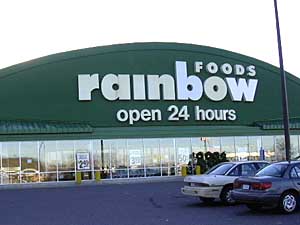|
Audio
Photos
More from MPR
Resources
Respond to this story
|
Rainbow curbs food shelf donations
December 13, 2004
 |
| A memo from Roundy's, Rainbow's owner, expressed concern about a potential or actual lawsuit as a result of giving out slightly old food. (MPR Photo/Melanie Sommer) |
St. Paul, Minn. — For at least five years, Rainbow has donated to food shelves around the Twin Cities, including one run by the Bloomington community group Volunteers Enlisted to Assist People.
"It was a very important pickup for us," said Christine Pulver, the group's food shelf manager. "Three days a week I would send a courier over to pick up bakery goods and/or produce. That would be anywhere from 500 to 1,000 pounds a week."
The food shelf distributes about 70,000 pounds of food each month. Pulver says the Rainbow donations brought in a significant portion of the fruits, vegetables and breads given out to families.
"We would receive the produce they were clearing off their shelves -- things that were looking just past prime," she said. "We would sort out and bag the good items for the clients here. The baked goods we would receive on their sell-by date, so they were still quite usable."
|
I just don't see it as an issue from a food safety standpoint at all.
- Kevin Elfering, Minnesota Agriculture Department |
Roundy's, which owns Minnesota's 30 Rainbow stores, is reportedly not so confident the food is safe. A spokeswoman at the Milwaukee-based company did not return multiple calls on Monday. But according to Pulver, the bakery manager at her local Rainbow told her the donations halted this month as a result of a corporate memo. The memo suggested Roundy's was concerned about a potential or actual lawsuit as a result of giving out slightly old food.
Minnesota's top food safety official is not sure what Roundy's might be concerned about.
"I just don't see it as an issue from a food safety standpoint at all," said Kevin Elfering, state Agriculture Department's director of dairy, food and meat inspection.
Elfering's office inspects the produce and other offerings at Minnesota's food shelves. To his knowledge, inspectors have never found a problem.
"Produce products and bakery products are not typically associated with any concern about foodborne illness because they're old," he said. "They're either contaminated or they're not."
By that, Elfering means food shelf fruits and vegetables are subject to the same risk of bacteria or other contamination as the produce in a grocery store. He says the fact that produce in a food pantry is slightly older has never been known to cause major illness. As long as grocery stores are not passing along items customers have returned, Elfering sees no problem with the practice.
Even in the event of a lawsuit, Roundy's could be protected by Minnesota's "Good Samaritan" law. An official with the Minnesota Health Department says the law would probably shield the company as long as it did not knowingly donate dangerous product. Christine Pulver, who runs the Bloomington food shelf, agrees.
"If there would be any liability, it would probably be against the food shelf if they held onto a donation too long before distributing to a client," Pulver said.
Pulver says her produce and bakery donations continue from other grocery chains, including Cub Foods and Byerly's.
But the policy change at Roundy's comes at a difficult time. The Emergency Food Shelf Network helps coordinate 60 food shelves in Minnesota and runs a number of food donation programs. The group's Marc Ratner says donations this year are down 25 percent.
"Food shelves usually rely on summer donations to help carry them into the holiday season. What we've seen is that donations have been down throughout the summer," Ratner said. "As a result, these food shelves are essentially running on empty into the holiday season."
Ratner says his group's direct partnership with Roundy's, called the Rainbow Initiative, will continue. The program allows Rainbow shoppers to purchase prepackaged bags of nonperishable foods and donate them on-the-spot.
A food workers' union representative who was able to reach someone at Roundy's says the company referred him to its giving through the Roundy's Foundation. According to a brief statement on the company Web site, the foundation focuses on family development, education, and hunger relief.
|
News Headlines
|
Related Subjects
|
